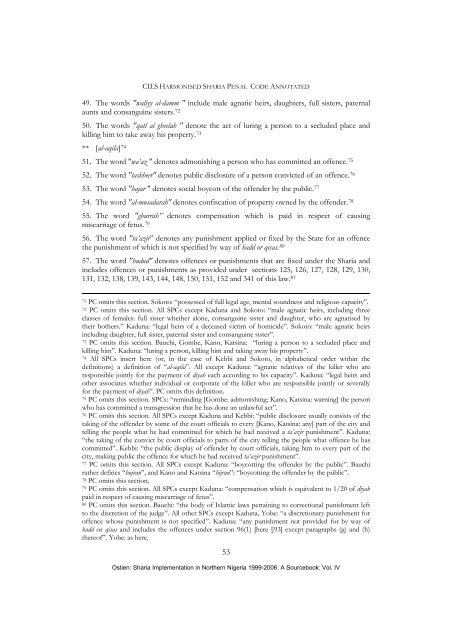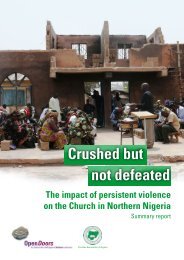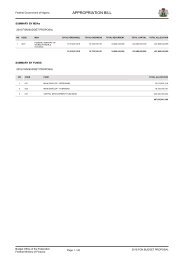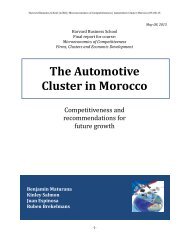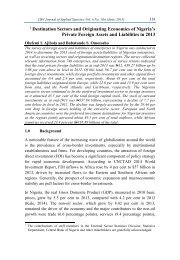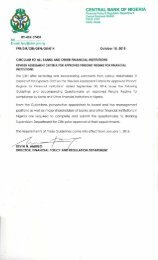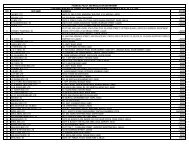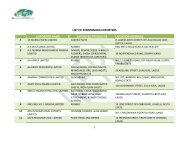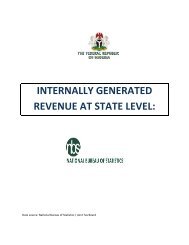vol_4_4_chapter_4_part_III
vol_4_4_chapter_4_part_III
vol_4_4_chapter_4_part_III
Create successful ePaper yourself
Turn your PDF publications into a flip-book with our unique Google optimized e-Paper software.
CILS HARMONISED SHARIA PENAL CODE ANNOTATED<br />
49. The words "waliyy al-damm " include male agnatic heirs, daughters, full sisters, paternal<br />
aunts and consanguine sisters. 72<br />
50. The words "qatl al gheelah " denote the act of luring a person to a secluded place and<br />
killing him to take away his property. 73<br />
** [al-aqila] 74<br />
51. The word "wa’az " denotes admonishing a person who has committed an offence. 75<br />
52. The word "tashheer" denotes public disclosure of a person convicted of an offence. 76<br />
53. The word "hajar " denotes social boycott of the offender by the public. 77<br />
54. The word "al-musadarah" denotes confiscation of property owned by the offender. 78<br />
55. The word "ghurrah” denotes compensation which is paid in respect of causing<br />
miscarriage of fetus. 79<br />
56. The word "ta’azir” denotes any punishment applied or fixed by the State for an offence<br />
the punishment of which is not specified by way of hadd or qisas. 80<br />
57. The word "hudud" denotes offences or punishments that are fixed under the Sharia and<br />
includes offences or punishments as provided under sections 125, 126, 127, 128, 129, 130,<br />
131, 132, 138, 139, 143, 144, 148, 150, 151, 152 and 341 of this law. 81<br />
71 PC omits this section. Sokoto: “possessed of full legal age, mental soundness and religious capacity”.<br />
72 PC omits this section. All SPCs except Kaduna and Sokoto: “male agnatic heirs, including three<br />
classes of females: full sister whether alone, consanguine sister and daughter, who are agnatised by<br />
their bothers.” Kaduna: “legal heirs of a deceased victim of homicide”. Sokoto: “male agnatic heirs<br />
including daughter, full sister, paternal sister and consanguine sister”.<br />
73 PC omits this section. Bauchi, Gombe, Kano, Katsina: “luring a person to a secluded place and<br />
killing him”. Kaduna: “luring a person, killing him and taking away his property”.<br />
74 All SPCs insert here (or, in the case of Kebbi and Sokoto, in alphabetical order within the<br />
definitions) a definition of “al-aqila”. All except Kaduna: “agnatic relatives of the killer who are<br />
responsible jointly for the payment of diyah each according to his capacity”. Kaduna: “legal heirs and<br />
other associates whether individual or corporate of the killer who are responsible jointly or severally<br />
for the payment of diyah”. PC omits this definition.<br />
75 PC omits this section. SPCs: “reminding [Gombe: admonishing; Kano, Katsina: warning] the person<br />
who has committed a transgression that he has done an unlawful act”.<br />
76 PC omits this section. All SPCs except Kaduna and Kebbi: “public disclosure usually consists of the<br />
taking of the offender by some of the court officials to every [Kano, Katsina: any] <strong>part</strong> of the city and<br />
telling the people what he had committed for which he had received a ta’azir punishment”. Kaduna:<br />
“the taking of the convict by court officials to <strong>part</strong>s of the city telling the people what offence he has<br />
committed”. Kebbi: “the public display of offender by court officials, taking him to every <strong>part</strong> of the<br />
city, making public the offence for which he had received ta’azir punishment”.<br />
77 PC omits this section. All SPCs except Kaduna: “boycotting the offender by the public”. Bauchi<br />
rather defines “hujran”, and Kano and Katsina “hijran”: “boycotting the offender by the public”.<br />
78 PC omits this section.<br />
79 PC omits this section. All SPCs except Kaduna: “compensation which is equivalent to 1/20 of diyah<br />
paid in respect of causing miscarriage of fetus”.<br />
80 PC omits this section. Bauchi: “the body of Islamic laws pertaining to correctional punishment left<br />
to the discretion of the judge”. All other SPCs except Kaduna, Yobe: “a discretionary punishment for<br />
offence whose punishment is not specified”. Kaduna: “any punishment not provided for by way of<br />
hadd or qisas and includes the offences under section 96(1) [here §93] except paragraphs (g) and (h)<br />
thereof”. Yobe: as here.<br />
53


